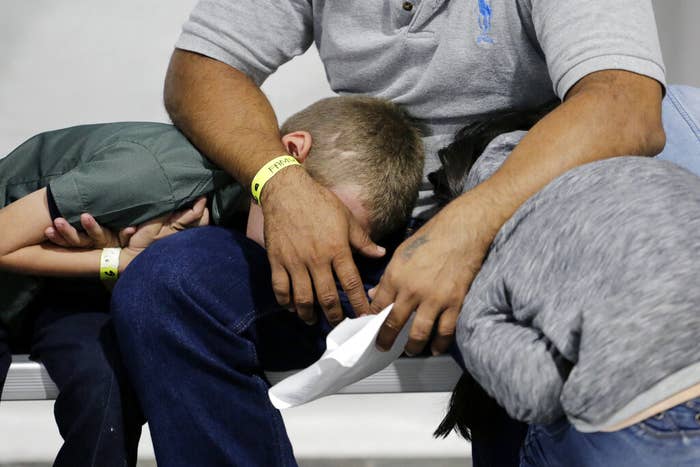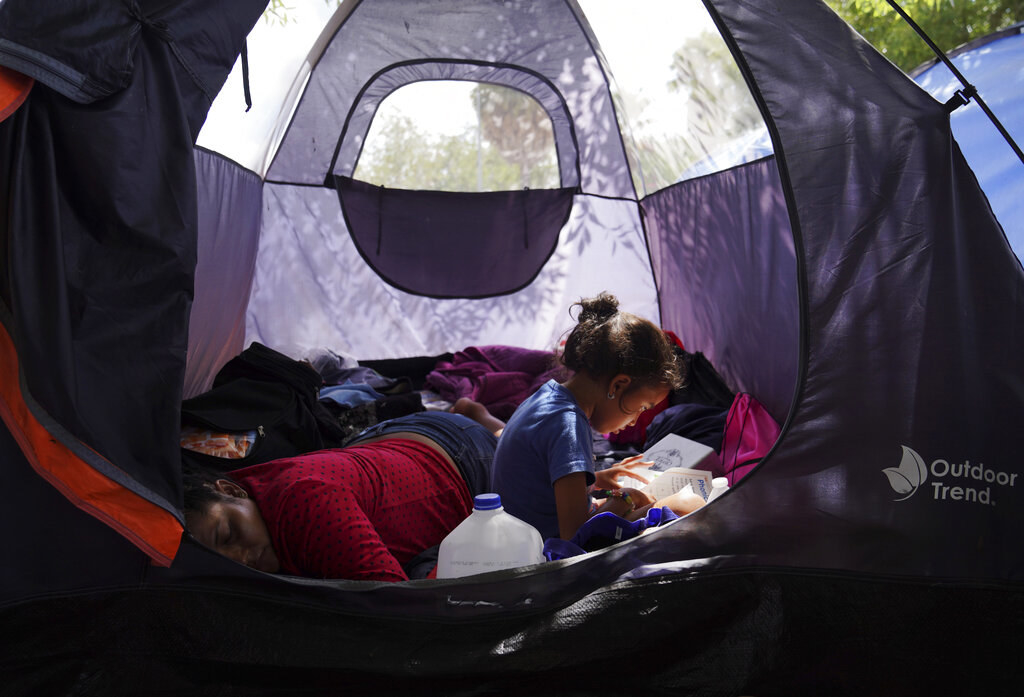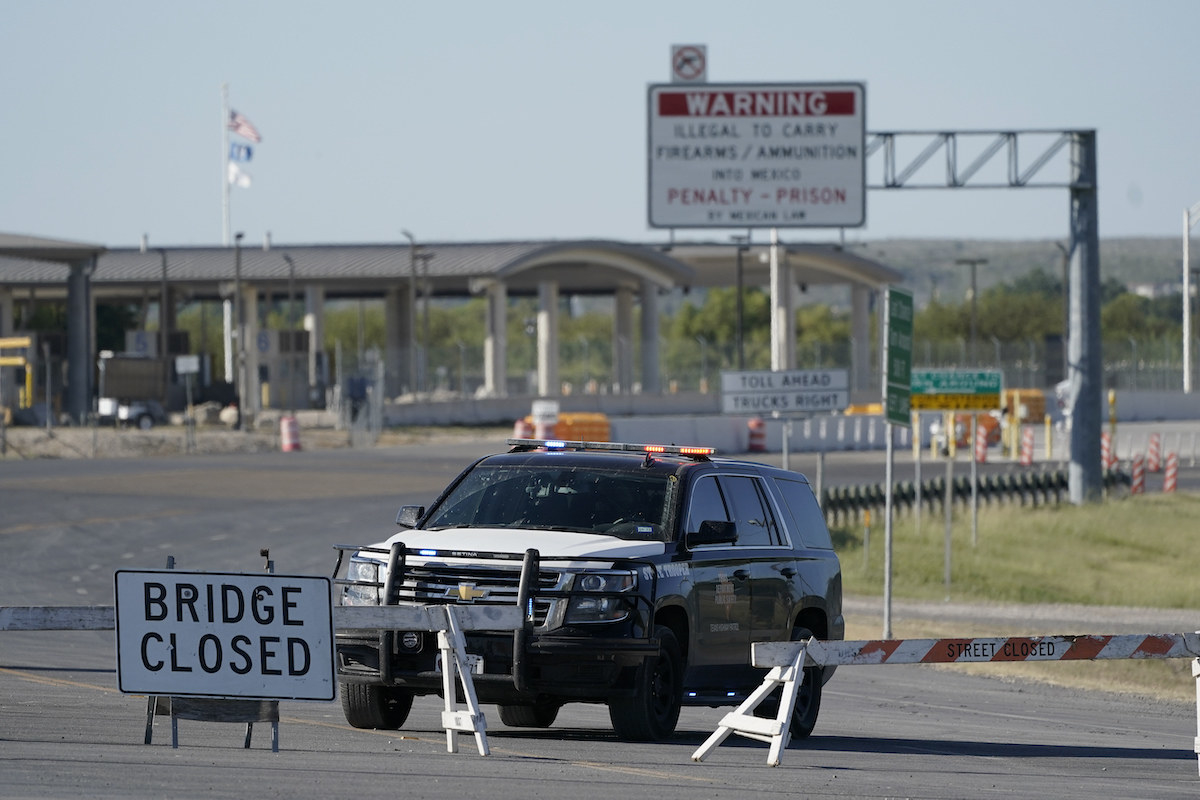
A new group of asylum-seekers has found themselves trapped in Mexico under a Trump-era program that was reinstated for the foreseeable future after the Biden administration suffered another court loss this week.
The so-called Remain in Mexico program, which forced more than 71,000 immigrants to wait in Mexico while their asylum cases were adjudicated by a US judge, had been shut down by President Joe Biden, but a federal court ordered it to be restarted, forcing people like Jose, an asylum-seeker from Nicaragua, to wait in dangerous conditions in Mexico.
Jose has been living in a shelter since being sent back under the program officially known as the Migrant Protection Protocols (MPP). Still in shock, he was especially confused after hearing from other Nicaraguan asylum-seekers who said they were with their friends and family in the US after crossing the border.
"I don't know why I'm in Mexico," Jose said. "I'm seeking asylum in the US and instead I'm in Mexico where it's dangerous for migrants."

Earlier this month, Biden was forced to bring back Remain in Mexico in order to comply with a federal court order after a judge determined that that the administration erred in the way they had rolled back the Trump-era policy.
In a more than 100-page ruling this week, the US 5th Circuit Court of Appeals backed that decision. "DHS claims the power to implement a massive policy reversal—affecting billions of dollars and countless people—simply by typing out a new Word document and posting it on the internet," the court wrote. The ruling, issued on Monday, makes it more likely that the policy will remain in place unless the administration succeeds in court.
As of Thursday, 161 immigrants and asylum-seekers had been placed into MPP since it was restarted, according to the International Organization for Migration. Most of them have been from Nicaragua, with others from Venezuela, Colombia, Cuba, and Ecuador. Central Americans and Mexicans continue to be sent back to Mexico under a different policy, Title 42, that the Biden administration has continued, citing the ongoing pandemic.

Jose, who declined to be fully identified fearing it would affect his asylum case, said he's worried about being kidnapped by cartel members in Mexico. As he prepared to cross into the US from Ciudad Juárez, he said he saw three men exit a car, yell at him to stop, and start to chase him. Jose then ran across shallow, dirty water until he made it to the US side of the border and was stopped by Border Patrol agents.
"They told me, ‘You're in the US now, not in Mexico, you don't have to run anymore,’" Jose said.
After he was detained for a few days, officers told him he had been chosen to be put in MPP. Jose said he spoke to someone on the phone who asked him if he feared being sent back to Mexico. He answered yes and told them about the men who had chased him, hoping it would be enough to avoid being sent back. The man on the other end of the line didn't say anything and kept asking questions for about 40 minutes. At the end, Jose said, the man told him he was going back to Mexico.
US border officers drove him to the middle of an international bridge that led to Ciudad Juárez, where Mexican authorities were waiting for him. Jose was tested for COVID-19 and then sent to a squalid shelter.
"It's disgusting," Jose said. "The bathrooms are a mess."
Julia Neusner, a refugee protection attorney at Human Rights First, said every immigrant she and her colleagues interviewed told them Customs and Border Protection did not actually ask them the 11 specific questions related to their physical and mental health on the printed questionnaire, even though CBP had checked "no" for each question.
"Most said CBP just asked generally if they had any health issues and a few were asked about their mental health, but some were asked no questions about their health at all, including a Nicaraguan man with chronic migraines who said CBP threw away his medication," Neusner said.
Many immigrants placed into the program were overwhelmed and confused by the process, Neusner said.
"The people we interviewed were really overwhelmed and distressed about the fact that they are going to be trapped for months in Ciudad Juárez, a notoriously dangerous city where they have no friends and family and no way to support themselves," Neusner said.
Jose said he doesn't remember being asked anything about his health by CBP.
"They just told me to sign papers and told me that whether I signed or not, I was going back to Mexico," Jose said. "The papers were in English, so I didn't understand them."
Jose said he'd already received one dose of the AstraZeneca vaccine but had yet to get the second shot. He asked CBP officers if he could get the second shot and was told to wait until the next day, Jose said. Instead, Jose was sent to Mexico under MPP without receiving a vaccination.
Part of the issue may have been that the US is only offering the J&J vaccine to immigrants. Jose said he would've taken the J&J shot, but it wasn't offered. Now he's worried he won't be able to attend his first court hearing in January because he’s not fully vaccinated.
"Imagine, the sacrifices I'm making by staying here and then to not be allowed to attend my hearing," Jose said.
People like Jose, who received a WHO-approved vaccine — which includes AstraZeneca — will be able to enter the US for their court hearings if they show proof of vaccination, the Department of Homeland Security said in a statement. But it's unclear if immigrants would need to have both shots or if one is enough.
Vaccines are provided to all immigrants placed in MPP, the DHS said, with the shots administered by Department of Health and Human Services contractors. Adults are offered the J&J vaccine and children who are eligible are offered Pfizer’s version.
DHS said it had been working with the Justice Department’s Executive Office for Immigration Review (EOIR), which oversees the nation's immigration courts, to ensure that an immigrant's first hearing in the US would align with the window of time for the second dose of the Pfizer vaccine.
DHS did not respond to specific questions about what will happen to immigrants who have only received one of two doses.
The return of Remain in Mexico was met with disappointment and anger from advocates, who said the first iteration was riddled with due process violations and put immigrants at risk. The Biden administration has presented the new iteration of MPP as more humane and pledged that some vulnerable immigrants wouldn’t be put into the program.
Under new agency guidance on the policy, vulnerable immigrants, such as those with known physical or mental health issues or who are older, should be exempted from Remain in Mexico. An internal government report obtained by BuzzFeed News found that while those with “known physical/mental health issues” were also prohibited under the Trump version from being turned away, border officials placed them in the program anyway.

Immigrants in MPP waited for months in dangerous border cities where they were subjected to rape, kidnapping, and murder, sometimes at the hands of Mexican authorities tasked with protecting them.
When Biden took office, his administration stopped enrolling new people in the program and started to allow immigrants in Remain in Mexico to enter the US to continue their asylum cases.
However, the Republican-led states of Texas and Missouri sued the administration and won an injunction that ordered the government to restart MPP. While the Biden administration has maintained it is being forced to do this, it has also expanded who can be placed in the Remain in Mexico program.
The expansion, which was not required by the court, to include anyone from the Western Hemisphere other than Mexico goes beyond those the Trump administration made eligible to be sent back. One senior DHS official previously told BuzzFeed News that the expansion "seems to belie the argument that we don’t want to implement MPP.”
Jose is hoping that the Biden administration will eventually prevail in its efforts to end MPP.
"Maybe then I will get the opportunity to make my case in the US instead of here," Jose said. "I don't have any family or friends in the US who can help me and I've tried calling attorneys to see if they can help, but no one is picking up."
While it can be difficult for an immigrant or asylum-seeker to find an attorney to take on an MPP case, having legal representation increases the chances that they'll be successful.
Only about 10% of the 71,044 immigrants placed in the MPP program during the Trump administration were able to get representation, according to the Transactional Records Access Clearinghouse (TRAC).
Without a lawyer, it can be hard for immigrants to figure out how to fill out asylum paperwork and know what specific experiences to share with a judge who is deciding whether they deserve protection. Figuring out the asylum process, attorneys and advocates say, is made only more difficult for immigrants who live under the constant fear of being kidnapped, attacked, and extorted by criminals at the border who see them as easy targets.
From February 2019 to February 2021, Human Rights First counted at least 1,544 public reports of murder, rape, and other attacks committed against people in MPP across the US–Mexico border. Since Biden took office, Human Rights First tracked another 6,356 reports of kidnapping, rape, and other attacks against immigrants expelled under Title 42 or blocked in Mexico who were subjected the same dangers as people returned to Mexico under MPP.

